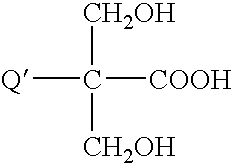Aqueous inkjet inks with ionically stabilized dispersions and polyurethane ink additives
a technology of ionically stabilized dispersions and polyurethane ink additives, which is applied in the field of aqueous inkjet inks, can solve the problems of water-sensitive printed images and the inability of dispersants to provide the optical density and chroma needed for emerging ink jet applications, and achieves improved gloss and distinctness of images, more smear resistance, and more durable
- Summary
- Abstract
- Description
- Claims
- Application Information
AI Technical Summary
Benefits of technology
Problems solved by technology
Method used
Image
Examples
examples
Ingredients and Abbreviations
[0294]BMEA=bis(methoxyethyl) amine
DBTL=dibutyltindilaurate
DMEA=dimethylethanolamine
DMIPA=dimethylisopropylamine
DMPA=dimethylol propionic acid
DMBA=dimethylol butyric acid
EDTA=ethylenediamine tetraacetic acid
HDI=1,6-hexamethylene diisocyanate
IPDI=isophoronediisocyanate
TMDI=trimethylhexamethylene diisocyanate
TMXDI=m-tetramethylene xylylene diisocyanate
NMP=n-Methyl pyrolidone
TEA=triethylamine
TEOA=triethanolamine
TETA=triethylenetetramine
THF=tetrahydrofuran
Tetraglyme=Tetraethylene glycol dimethyl ether
[0295]Unless otherwise noted, the above chemicals were obtained from Aldrich (Milwaukee, Wis.) or other similar suppliers of laboratory chemicals.
[0296]TERATHANE® D 650 is a 650 molecular weight, polytetramethylene ether glycol (PTMEG) from Invista, Wichita, Kans.
[0297]TERATHANE® 250 is a 250 molecular weight, polytetramethylene ether glycol
Extent of Polyurethane Reaction
[0298]The extent of polyurethane reaction was determined by detecting NCO...
PUM
| Property | Measurement | Unit |
|---|---|---|
| particle size | aaaaa | aaaaa |
| weight fraction | aaaaa | aaaaa |
| viscosity | aaaaa | aaaaa |
Abstract
Description
Claims
Application Information
 Login to View More
Login to View More - R&D
- Intellectual Property
- Life Sciences
- Materials
- Tech Scout
- Unparalleled Data Quality
- Higher Quality Content
- 60% Fewer Hallucinations
Browse by: Latest US Patents, China's latest patents, Technical Efficacy Thesaurus, Application Domain, Technology Topic, Popular Technical Reports.
© 2025 PatSnap. All rights reserved.Legal|Privacy policy|Modern Slavery Act Transparency Statement|Sitemap|About US| Contact US: help@patsnap.com



